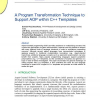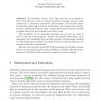JOT
2010
15 years 14 days ago
2010
Aspect-oriented programming (AOP) provides assistance in modularizing concerns that crosscut the boundaries of system decomposition. Aspects have the potential to interact with ma...
128
click to vote
CASC
2010
Springer
15 years 1 months ago
2010
Springer
Computer algebra in scientific computation squarely faces the dilemma of natural mathematical expression versus efficiency. While higher-order programming constructs and parametri...
128
click to vote
FOSSACS
2008
Springer
15 years 3 months ago
2008
Springer
We introduce Erasure Pure Type Systems, an extension to Pure Type Systems with an erasure semantics centered around a type constructor indicating parametric polymorphism. The eras...
143
click to vote
DLS
2005
15 years 4 months ago
2005
The DDP (Demand-driven/Pruning) analysis algorithm allows us to perform data-flow analyses of programming languages that are dynamically typed and have higher-order control flow...
170
click to vote
OOPSLA
1995
Springer
15 years 5 months ago
1995
Springer
All object-oriented languages provide support for subtype polymorphism, which allows the writing of generic code that works for families of related types. There is also a need, ho...
117
click to vote
CODES
2004
IEEE
15 years 5 months ago
2004
IEEE
High-level hardware modeling is an essential, yet time-consuming, part of system design. However, effective component-based reuse in hardware modeling languages can reduce model c...
165
click to vote
TLCA
1993
Springer
15 years 6 months ago
1993
Springer
In this paper we introduce a logic for parametric polymorphism. Just as LCF is a logic for the simply-typed λ-calculus with recursion and arithmetic, our logic is a logic for Sys...
JMLC
1997
Springer
15 years 6 months ago
1997
Springer
Strongly typed polymorphism is necessary for expressing safe reusable code. Two orthogonal forms of polymorphism exist: inclusion and parametric, the Oberon language only supports ...
139
click to vote
POPL
1997
ACM
15 years 6 months ago
1997
ACM
Languages like ML and Haskell encourage the view of values as first-class entities that can be passed as arguments or results of functions, or stored as components of data struct...
110
click to vote
ICSE
2001
IEEE-ACM
15 years 6 months ago
2001
IEEE-ACM
Object-oriented frameworks are a popular mechanism for building and evolving large applications and software product lines. This paper describes an alternative approach to softwar...


